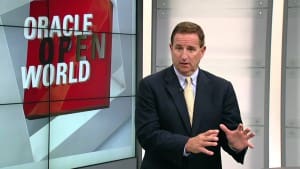Mark Hurd, the CEO of Oracle, made some bold predictions for where the enterprise market is going.
Prediction 1: 80% of all applications will run in the Cloud by 2025. Today, he said, 24 percent of enterprise applications are in the cloud.
Prediction 2: By 2025, Two Suite providers will have 80% of the SaaS Applications market. Further, Oracle will be one of the two.
Prediction 3: 100% of New Development Testing will be in the Cloud by 2025.
Prediction 4: Virtually all Enterprise data will be in the Cloud by 2025.
Prediction 5: Enterprise Clouds will be the most secure IT environments.
Mark Hurd’s Keynote at Oracle OpenWorld on Monday October 26th
These predictions are praiseworthy because they are bold and specific. In 2025, we will be able to look at the Enterprise market and see which of these predictions turned out to be right.
But they are also somewhat self-serving; these predictions appear to be designed to create a Cloud bandwagon effect. And, not surprisingly, the main theme of the conference was that companies should be buying Cloud applications. Companies should do this because, in comparison to on premise solutions, the total cost of ownership (TCO) is better, Cloud solutions are much easier to upgrade, and Cloud data is more secure.
As to the total cost of ownership, it is a bit difficult to gauge right now because these are new solutions. However, one solution that has been sold in the Cloud for a while is Oracle Transportation Management (OTM). I talked to one of Oracle’s main integrators for OTM, and their estimate was that implementations were 40 to 60 percent faster. But I believe they were talking about a “templated” solution that was preconfigured.
There was also a customer panel where early adopters were invited to talk to industry analysts about their Cloud experience. Most of the companies were not fully implemented, but one of the customers, one of the world’s largest, had implemented financials in Canada. Based on this implementation, that CIO believes that implementations will end up being about 30 to 40 percent faster. This seems like a more reasonable estimate to me.
One reason for faster implementations is that Cloud solutions are off the shelf solutions that are not customized. The early adopter Customer panel was asked about this. Three of the five customers said they were customizing the solution by building customizations using Platform as a Service tools so that their upgrade path could be protected. Nevertheless, the impression I was left with was even those that were customizing the solution were doing so to a far smaller extent than what has historically been the norm.
The final idea, that Cloud data is more secure, is something that probably generates a fair bit of skepticism.
Both Mr. Hurd and Larry Ellison, the Executive Chairman at Oracle, addressed this issue by speaking about how their solutions use encryption to protect data. I am no expert on encryption, but ARC’s IT security analyst – Sid Snitkin – listened to Mr. Ellison’s Tuesday afternoon keynote remotely and was impressed by what he heard.
My opinion is that Oracle will make security a core competence. That is something I believe most companies would admit they won’t do, and probably could not do even if they decided this was a goal.
But, the security issue is more complex than just insuring outside hackers can’t get access to a company’s data. In the wake of the Snowden revelations, companies want to make sure governments can’t get access to their data as well. Mr. Hurd stated, “If the government says give us your data, we’d say ‘No.’” If they got a subpoena, we would say ‘OK,’ but we would give the government encrypted data. The government would not be able to make sense of the data.”
Mr. Ellison made the point that a key question for SaaS providers is whether their internal technicians could decrypt their customer’s data. At Oracle the answer to that question would be “no,” their database administrators would not be able to make sense of the data. Mr. Ellison stated that very few SaaS providers would be able to say the same. For the security conscious, an onsite server could be designated as the site for all encryption keys.
Oracle recognizes that many companies own on premise Oracle applications. They recognize that the transition to Cloud for most existing companies will not be Big Bang but rather one application at the time. They support these kinds of hybrid environments.


















